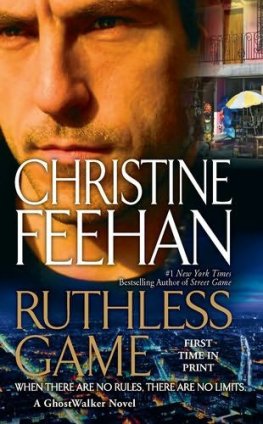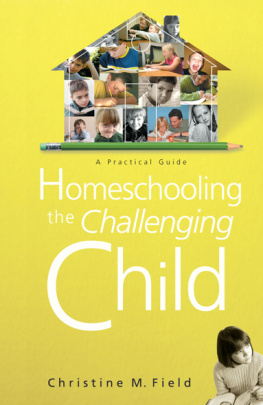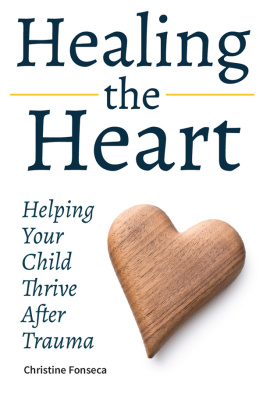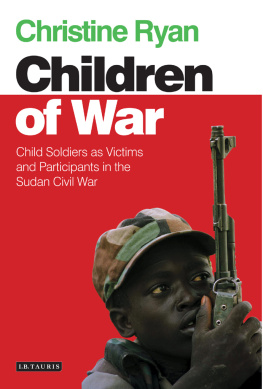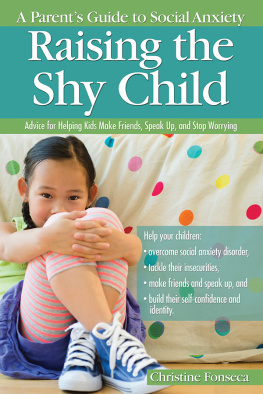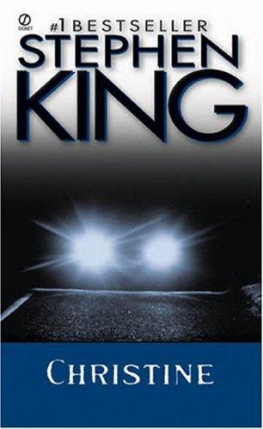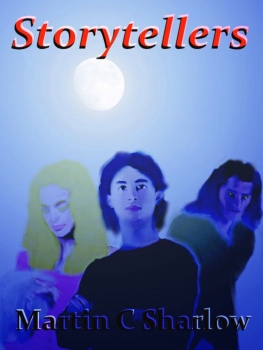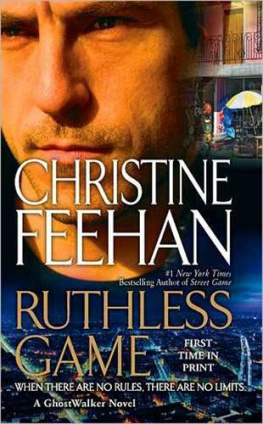Christine Brown - The Storytellers Child
Here you can read online Christine Brown - The Storytellers Child full text of the book (entire story) in english for free. Download pdf and epub, get meaning, cover and reviews about this ebook. year: 2020, publisher: Austin Macauley Publishers, genre: Detective and thriller. Description of the work, (preface) as well as reviews are available. Best literature library LitArk.com created for fans of good reading and offers a wide selection of genres:
Romance novel
Science fiction
Adventure
Detective
Science
History
Home and family
Prose
Art
Politics
Computer
Non-fiction
Religion
Business
Children
Humor
Choose a favorite category and find really read worthwhile books. Enjoy immersion in the world of imagination, feel the emotions of the characters or learn something new for yourself, make an fascinating discovery.

- Book:The Storytellers Child
- Author:
- Publisher:Austin Macauley Publishers
- Genre:
- Year:2020
- Rating:5 / 5
- Favourites:Add to favourites
- Your mark:
- 100
- 1
- 2
- 3
- 4
- 5
The Storytellers Child: summary, description and annotation
We offer to read an annotation, description, summary or preface (depends on what the author of the book "The Storytellers Child" wrote himself). If you haven't found the necessary information about the book — write in the comments, we will try to find it.
The Storytellers Child — read online for free the complete book (whole text) full work
Below is the text of the book, divided by pages. System saving the place of the last page read, allows you to conveniently read the book "The Storytellers Child" online for free, without having to search again every time where you left off. Put a bookmark, and you can go to the page where you finished reading at any time.
Font size:
Interval:
Bookmark:
Christine Brown
Austin Macauley Publishers
2020-05-04
Christine Brown has worked as a journalist on national and regional newspapers and womens magazines. Her first book, Goodbye Patrick, told the story of her five adopted children. Her second book, The Visits, told the story of her visits she made, over the years, to men in one particular prison. She read English literature at St Hildas College, Oxford, and went on to do her PhD at Reading University. She was born in Edinburgh and now lives in Buckinghamshire.
Christine Brown (2020)
The right of Christine Brown to be identified as author of this work has been asserted by her in accordance with section 77 and 78 of the Copyright, Designs and Patents Act 1988.
All rights reserved. No part of this publication may be reproduced, stored in a retrieval system, or transmitted in any form or by any means, electronic, mechanical, photocopying, recording, or otherwise, without the prior permission of the publishers.
Any person who commits any unauthorised act in relation to this publication may be liable to criminal prosecution and civil claims for damages.
Austin Macauley is committed to publishing works of quality and integrity. In that spirit, we are proud to offer this book to our readers; however, the story, the experiences, and the words are the authors alone and portrayed to the best of their recollection. In some cases, names and details have been changed to protect the privacy of the people involved.
A CIP catalogue record for this title is available from the British Library.
ISBN 9781528983570 (Paperback)
ISBN 9781528983587 (ePub e-book)
www.austinmacauley.com
First Published (2020)
Austin Macauley Publishers Ltd
25 Canada Square
Canary Wharf
London
E14 5LQ
We were never the kind of family to keep picture albums. I have only two photographs of my father, taken 25 years apart. He is in the army uniform in both, one taken in France during the First World War and the other in India during the second. The only one I have of my mother was taken in Americas mid-west probably in the late 1920s. There is neither name nor date on the back of this picture. In it, my mother is one of a mixed group all perched on the back of an old pick-up truck. She might have been with family members or friends on some kind of an outing, maybe a picnic. They could have been farm workers since they are mostly in denim work clothes. Whatever the explanation, they do not look like an affluent group. This is a picture which could have illustrated Steinbecks novel The Grapes of Wrath. There is nothing which could connect these photographs of my parents.
My father had written on the back of his picture: To Mother from Walter, France 1917. He is pictured with three other young men all in the uniform of the Dublin Fusileers. The picture was sent home to his mother in Sligo. You can still make out her name and address on the back of this picture. The other photograph was taken in Calcutta, 25 years later, where he served with the Royal Artillery. In it, my father is shaking hands with a Sikh policeman who had given him a blood transfusion. He must have sent that picture home to my mother in Edinburgh.
The photograph of my mother on the pick-up truck might have been sent home to her parents in Edinburgh. She had a brief, unhappy time in America so its hard to know why she would want a souvenir. She is certainly not one of the smiling faces in this photograph. Neither of my parents lives was well-recorded. That meant each life was more like a jigsaw puzzle with the important pieces missing. Somehow, eventually, both these lives came together and the jigsaw was complete after a fashion.
My father, being Irish, enjoyed telling a good tale always an Irish tale. I enjoyed being his audience. There was nothing self-conscious or rehearsed about the telling of these stories. My childhood memory of it is that it just seemed to happen. This was not bedtime story telling since my parents never did that. We did not have books in our house, childrens books or books of any kind. These stories that my father told were never very long or detailed so they were ideal listening for a child. At least I found them so. For me much of the enjoyment was in listening to my fathers soft Irish brogue. His stories were unexpected, neither introduced nor given any explanation, and always told from the old armchair of his in our kitchen. His story telling was not strong on detail but for me it always conjured up a clear picture. There were no specifics about his leaving of Ireland or about his arrival in Edinburgh. There was nothing about his boat journey and absolutely nothing about his boyhood life in Ireland. Maybe he expected me to fill in the gaps by asking questions about that journey and how it came about. I never did. I enjoyed just being his audience of one. Here is how it went:
Once I got off the boat in Liverpool, I just began to walk. Whether my father had meant Edinburgh for his destination or he just stopped when he got tired of walking was never made clear. Since I had no idea of the distance from Liverpool to Edinburgh or how long it would take, it sounded to me like a nice kind of walk so I always pictured that day as being sunny. His one friendly encounter on that walk had been with a clergyman working in his garden.
He wore the collar, my father explained. He told this story more than once and each time he illustrated it in the same way by moving his finger around his neck.
He was not, you know That meant, as my mother would have put it that this clergyman was not one of us. According to my father, you could tell the difference between a Catholic priest, one of us, and a Protestant minister by the way they parted their hair. Any reference he made to the priesthood or the Catholic faith generally was always in the same flippant, joking, manner. My parents attitude to their faith was one of the biggest differences between them. My mother was a devout practising Catholic and brought her family up in that tradition. I cannot recall ever seeing my father in Church so I think it would be fair to describe him as lapsed. When the family left for Sunday Mass, it was taken for granted that my father stayed at home, relaxing in his kitchen chair reading the Sports section of the Sunday Post. No one questioned why he was not coming to Mass with the rest of us. When we got back home, my father set to and cooked fried bread for our breakfast. Since we had fasted from midnight, the taste of this fried bread, crisp on the outside and soft inside, is forever connected with Sunday Mass. The story about his long walk always concluded with:
He called me over to his garden and filled my pockets with apples.
It was the one clear detail he ever recounted of his leaving of Ireland. Presumably, that was the only kindness he received on his walk since he mused over that incident many times. Indeed, it had a long-lasting effect on him since he never passed a beggar in the street and passed that advice on to his children.
His arrival in Edinburgh was less joyful and any account I have of it came in bits and pieces from my mother. Whether my father had any idea of how his new life would be was never made clear but the first object lesson came when he started looking for work. Factories in Edinburgh at that time, the 1920s, displayed explicit notices which read No Irishmen need apply. To make it clear what the general feeling was then, one of the citys entertainments was at the Mound in Princes Street where a Protestant Action group regularly set up their stall. Their listeners were entertained with colourful stories of impoverished Irish Catholics having to pay priests hearing their confessions. There were always lurid accounts of what went on behind convent doors as well as colourful stories about the Pope. The message was that Catholics were different and were not welcome in a Protestant country. They were infiltrating Scotland and, of course, every Irishman was known to be Catholic.
Font size:
Interval:
Bookmark:
Similar books «The Storytellers Child»
Look at similar books to The Storytellers Child. We have selected literature similar in name and meaning in the hope of providing readers with more options to find new, interesting, not yet read works.
Discussion, reviews of the book The Storytellers Child and just readers' own opinions. Leave your comments, write what you think about the work, its meaning or the main characters. Specify what exactly you liked and what you didn't like, and why you think so.

